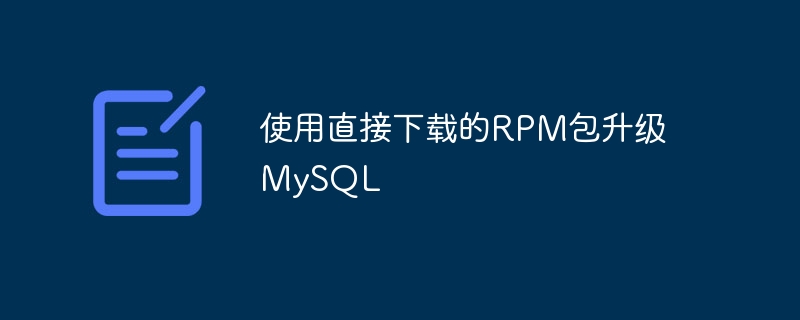Home >Database >Mysql Tutorial >Upgrade MySQL using directly downloaded RPM packages
Upgrade MySQL using directly downloaded RPM packages
- WBOYWBOYWBOYWBOYWBOYWBOYWBOYWBOYWBOYWBOYWBOYWBOYWBforward
- 2023-09-06 23:49:02847browse

MySQL can be upgraded on RPM-based platforms using the MySQL Yum repository or MySQL SLES
Upgrading using RPM packages
If you need to upgrade MySQL using RPM packages downloaded directly from the MySQL Developer Zone, go to the folder containing all downloaded packages (make sure no other RPM packages have similar name) and use the following command -
yum install mysql−community−{server,client,common,libs}−*Yum is replaced with zypper for SLES systems and with dnf for systems that support dnf.
It is best to use advanced package management tools such as yum to install packages, but users who prefer direct rpm commands can replace the yum install command with the rpm -Uvh command.
Restart the server
At the end of the installation, if the MySQL server is running, it will automatically restart when the upgrade installation begins.
If the server is not running when the upgrade installation begins, the user must explicitly restart the server after the upgrade installation is completed. This can be done using the following command -
service mysqld start
Execute the mysql_upgrade command
After the server is restarted, the "mysql_upgrade" command will be executed to check and resolve incompatibility issues between the old data and the upgraded software.
Upgrade to MySQL Enterprise Server
Upgrading MySQL from the community edition to the commercial edition requires users to uninstall the community edition first and then install the commercial edition.
Interoperability package with operating system native MySQL
Many Linux distributions provide MySQL as an integrated part of the operating system itself. When the latest version of Oracle's RPM is installed using standard package management tools (yum, dnf or zypper), it will easily upgrade and replace the MySQL version that comes with the operating system,
Upgrades from non-native MySQL packages
If the user installed MySQL using third-party packages that did not come from the user's Linux distribution's native software repositories (let's take an example: packages downloaded directly from the vendor), Users need to uninstall all these packages before upgrading using packages from Oracle.
The above is the detailed content of Upgrade MySQL using directly downloaded RPM packages. For more information, please follow other related articles on the PHP Chinese website!

